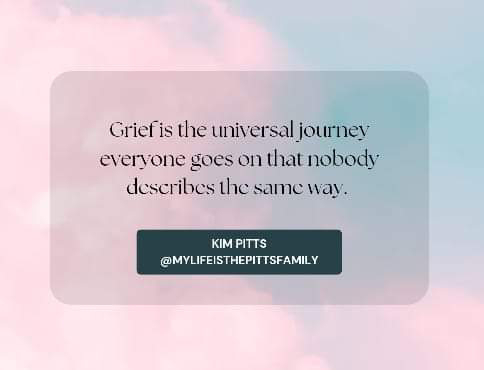Grief Counseling
Imagine you are standing at the edge of a dark, dense forest. The ground behind you has fallen away, you cannot go back the way you came. There is no way to skirt around the forest ahead; you must enter it or exist forever where you are.
Next to you are four people to give you counsel.
The first person says, "When I went through this forest, it was awful. I got lost and wandered in circles for the longest time. It was just awful."
The second person says to the first person, "If it makes you feel any better, when I went through this forest I got stuck in a swamp. Never saw it. Just stepped right in it and sank up to my knees. I struggled so hard to get out. Lost one of my good boots and my walking stick." And to you, she says, "Those things can be replaced, of course, but still."
The third person says, "If you think that's bad, when I went through this forest I had to deal with the monkeys. The biting, the scratching. The little buggers throwing their feces from the trees. But the constant screeching! Oh, that was the worst!"
The fourth person says, "I'm so sorry you have to go through this forest. We all have to do it some time, and it's different for everyone. Here's a map to help you find your way, and here's a flashlight for when it gets really dark. And here's a satellite phone so you can call me when you need to talk or hear a friendly voice."
Now imagine the dark, dense forest is your future after someone you love has died. And the four people are friends and family members who are trying to help.
I've traveled through that damned forest several times, and I've had mostly lousy counsel. Usually, they were more interested in talking about their own experiences than listening.
I've been fortunate to get some professional grief counseling. But three out of four non-professional encounters have been unhelpful and sometimes harmful.
I had a well-meaning relative who wondered aloud which was worse: knowing ahead of time that a loved one was going to die, or having a loved one die without any warning at all. She then told me that other relatives had hoped my mom wouldn't die on the one-year anniversary of another relative's death and how relieved she was that it turned out not to be the same day. Her advice to me, which I hadn't asked for, was to touch my mother's body because that's what she did at her brother's funeral, and it helped her come to terms with his death.
A coworker asked me what kind of cancer my sister had. When I told her the tumors were on my sister's liver, she was relieved. She told me about someone she knew who had rectal cancer, and it was the worst. "Can you imagine?" she said. "Ass cancer!" And she walked away very sure she had cheered me up.
Three out of four people absolutely let me down.
If someone you know is grieving, be their fourth person. Acknowledge their grief, express sympathy, and offer support. Don't try to tell them how they should feel, how to get past it, or to be thankful it isn't worse.
Be their fourth.


No comments:
Post a Comment